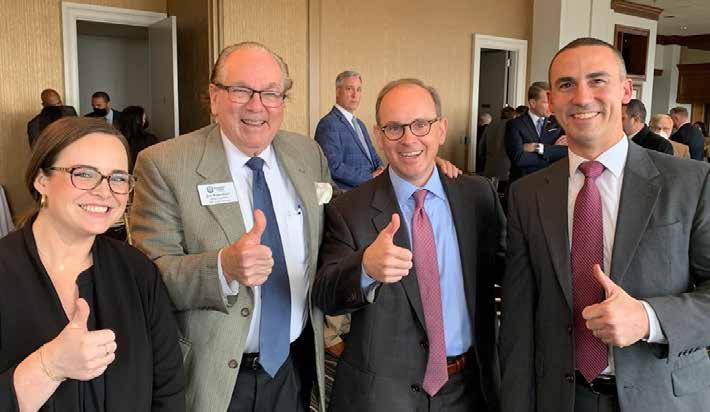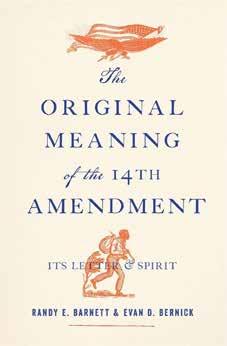
12 minute read
Hon. Allie Greenleaf Maldonado
by N. Lauryn Boston
Advertisement
N. Lauryn Boston is a licensed attorney in Washington State and is privileged to work in Indian law. She earned her J.D. from the University of Colorado at Boulder, where she was active in the Native American Law Students Association and president of the American Constitution Society law student chapter. She holds a certificate in mediation from Harvard Law School. She can be reached at lauryn. boston@muckleshoot.nsn. us. © 2022 N. Lauryn Boston. All rights reserved. he reservation lands of the Little Traverse
TBay Bands of Odawa Indians (“LTBB Tribe”) lie along the picturesque northern shores of Michigan’s Lower Peninsula, where great white pine, red oak, and colorful sugar maple dominate the landscape of a region once called by the native Odawa “the land of the crooked tree.”1 It is here that the Hon. Allie Greenleaf Maldonado presides as chief judge of the LTBB tribal court, a position she’s held since 2012, after spending nine years as assistant general counsel for the LTBB Tribe.
Judge Maldonado is both a citizen of the LTBB Tribe and a transplant to the great state of Michigan. She is simultaneously a Native American with roots deep in her ancestral homeland and a newcomer to the LTBB reservation and tribal community. The path that led her home to a place she’d never been before was motivated, in part, by a need to understand and reconcile a painful and buried family history that took place on the reservation between and 1889 and 1983.2 What she learned about her own family inspired her to pursue a career in law and ultimately a place on the bench in Indian Country.
Set amid the burgeoning suburban enclave of Harbor Springs, Mich., and surrounded by art galleries, golf courses, and scenic shoreline walking trails, the reservation belonging to the LTBB Tribe occupies a small corner of the Eastern Woodlands territory that once belonged to the Odawa nation, a vast region of land stretching from Ontario, Canada, to the northeastern United States.Today, the LTBB Tribe consists of approximately 5,000 enrolled members who endeavor to maintain their cultural heritage while administering a modern tribal government, deftly combining traditional native practices with cutting-edge science and technology to address a range of issues, from forest management and climate change mitigation to food sovereignty and restorative justice.3 This type of innovation has helped the LTBB Tribe create promising opportunities for its citizens, even as it grapples with the long-term negative effects of historic trauma created by U.S. policies toward Native Americans that cost Indian families their land, their sovereignty, and even their children.
The practice of removing Indian children from their parents and placing them for adoption or at Indian boarding schools was an official U.S. policy that ripped thousands of Native American children across the country from their families and communities. Ostensibly intended as a way to lift Indian children from poverty, it was in fact a form of cultural genocide that resulted in the destruction of entire family units, the effects of which still resonate today in the lives of thousands of tribal descendants and survivors of this practice.4 Located in Harbor Springs, Holy Childhood was one of the last Indian boarding schools to operate in Michigan. Opened as a mission school in 1889, it did not cease operation until 1983.5 Many Odawa tribal families were forever affected by its legacy.
Despite these challenges, the LTBB Tribe continues to persevere. It could be said that through hard work and a focus on education and training, the LTBB Tribe has succeeded in creating an environment where its citizens and children can thrive, achieve their potential, and give back to their community— and in this sense, the LTBB Tribe and Allie Greenleaf Maldonado have much in common.
After earning a bachelor’s degree in business from the City University of New York in 1995, Judge Maldonado graduated in the top third of her class from
the University of Michigan Law School. There, she was a contributing editor of the Michigan Law Review. She earned a spot in the highly competitive Honors Program at the U.S. Department of Justice and worked as a staff attorney in the Indian Resources Section of the Environment and Natural Resources Division before becoming assistant general counsel for the LTBB Tribe.
She has received numerous awards and recognitions along the way. For her work on the drafting of the Michigan Indian Family Preservation Act, Judge Maldonado was voted “Woman of the Year” by her peers and the Michigan Lawyers Weekly in 2014.6 She successfully litigated the first case that, upon appeal, overturned a termination of parental rights due to the state of Michigan’s failure to follow the provisions of the Indian Child Welfare Act (ICWA). She wrote the amicus brief in In re Morris that successfully persuaded the Michigan Supreme Court to adopt a policy of “conditional reversal” in ICWA cases.7 Her advocacy for ICWA and determination to bring Michigan and other states into compliance have earned her the “Unsung Hero” award from the Michigan State Bar, as well as the “Michiganian of the Year” award from The Detroit News. Additionally, she is a 2016 Honoree of the “Women Inspiring Change” award from Harvard Law School as part of its annual International Women’s Day Portrait Exhibit, which showcases the astounding contributions of women to the areas of law and policy.8
In 2018, she was a contributing author for the book Tough Cases (The New Press, NY). In it, judges from across the country recount some of their most high-profile and challenging cases, providing a rare first-person account of how they arrived at the decisions they made from the bench. Judge Maldonado’s contribution is called Walking With My Ancestors: Tribal Justice for Salmon Running, which relates the story of a young tribal woman who lost parental rights to two young children due to substance abuse yet continued down a path of addiction, drug dealing, and criminal behavior seemingly without remorse. Balancing the need to protect the community as well as the rights and future of a tribal citizen, Maldonado found herself in the position of having to weigh the tribal court prosecutor’s harsh recommendations against her own instincts. Drawing upon the teachings of a respected tribal elder who started the LTBB Tribe’s first Healing-to-Wellness Program, Judge Maldonado arrived at a difficult decision: she would override the advice of her valued team members and give Salmon Running a second chance by allowing her to participate in the program instead of going to jail. Known as Waabshii Miigwan (White Feather) Healing Court, the innovative program offers a holistic approach to restorative justice for substance abuse offenders, providing them with a culturally centered pathway to wellness utilizing Odawa values and teachings.
The decision proved pivotal, both for Salmon Running and for Judge Maldonado. For the young woman, it represented the first time anyone had demonstrated such faith in her ability to finally break free from the cycle of drug abuse and addiction, and to work her way toward becoming a healthy and contributing member of her tribal community. For the judge, it represented a leap of trust in the power of traditional native teachings and alternatives to the familiar but punitive system of criminal justice. Such a decision would be difficult and risky even for a tribal judge raised within their own tribe and steeped in its traditions. Allie Greenleaf Maldonado did not have that advantage.
Born to a native LTBB Odawa mother who was removed from her tribe as a child and a Jewish father who designed oil refineries all across the country, Judge Maldonado spent her entire childhood as an outsider learning how to be “the new kid on the block.” She lived in 19 different locations before she graduated law school, but the reservation in Harbor Springs was not one of them. “I grew up knowing I was Native American,” she says, “but my mother couldn’t teach me much more than that because she had had her own culture erased.”
Judge Maldonado’s mother, Donna Lou Chapman, was removed from the LTBB Tribe after her own mother died. Although only a child, she was sent to live with a Mennonite minister and his wife to serve, essentially, as their live-in domestic servant. “They purposefully cut her off from her community,” says Judge Maldonado. “They cut her hair and put Clorox on her skin to try and lighten it. They told her she wasn’t wanted, that nobody [from the reservation] wanted her. And they told her to lie and say she was Armenian instead of Native American.” Likewise, Judge Maldonado’s grandmother, Ella Lou Bush, and all of her uncles had similar experiences after being sent to the Indian boarding school in Harbor Springs. “My grandmother kept taking my uncle Dale and running away. She would walk from Harbor Springs all the way back to the family in Goodheart. The third time she did that, the Indian agent took all four of her children away to the Mount Pleasant boarding school, where they stayed for nine years without ever being allowed to return home.”
Like her mother, Judge Maldonado’s uncles were sent in the summers to work on local farms, providing free labor under the auspices of “job training.” The goal, in the words of Richard Henry Pratt, founder of Carlisle Indian Industrial School, the first government-run Indian boarding school, was to “kill the Indian, save the man.”9
The brutality of this practice began to wane in the 1930s yet did not completely cease in Michigan until the 1980s, leaving generations of native children forever scarred by what they endured. Many, like Judge Maldonado’s mother, never returned to their tribe or their families. Those who did return often faced the emotional trauma of trying to integrate back into a culture from which they had been alienated. “My mother spent her whole life looking for a purpose and a place. It left her feeling really lost,” Judge Maldonado recollects. “I remember my mother bouncing from religion to religion, from community to community, trying to be a part of all sorts of different things.”
The remnants of this lingering sense of isolation affected Judge Maldonado’s own self-identity, particularly growing up in various states without ever being able to put down roots in one place for very long. “I remember being mistaken for Chinese or Japanese by other kids in Louisiana or California,” she recalls. “In Texas, people thought I was Mexican, in New York it was Puerto Rican. I was literally mistaken for whatever the predominant ethnicity was, in whatever area we happened to live.”
Facing discrimination was something Judge Maldonado learned to overcome at an early age. She was attending school in Louisiana when the federal courts issued their desegregation order following the decision in Brown v. Board of Education, prompting a crisis of intense public resistance. When 6-year-old Ruby Bridges enrolled in a New Orleans elementary school in 1960, it was followed by a resurgence of racial animosity against non-white students of all ethnicities. “It wasn’t easy growing up with a Native American mother and a Jewish father,” she laughs. “Not in that era.” The injustice of discrimination together with her knowledge of how racist assimilation policies had harmed her own family precipitated her desire to pursue a career devoted to social justice and the law. “I went to law school because I wanted to do whatever I could to make sure that what happened to my mother and to my grandmother, and to my great-grandmother who lost her children, didn’t happen to anyone else. There is not one person in my community [at Little Traverse Bay] who wasn’t affected.”
Judge Maldonado was in law school the first time she set foot on the reservation at Little Traverse Bay, the place where her mother was born but to which she had never returned.
I went to a pow wow and was stunned—because I had never seen faces that looked like my own, other than my mother’s. I never blended in anywhere. I never lived anywhere that I felt I fit in. And that makes you feel very alone. One psychologist has termed it “split feather syndrome.” You never feel like you fit in with the dominant majority, but you don’t quite fit in with the community in which you should have been raised.
The experience of discovering her ancestry and tribe was transformative. “It just makes you think, maybe I belong here.” She joined the tribe as assistant general counsel shortly after law school and now, as chief judge, remains devoted to advocating for tribal rights and issues.
Judge Maldonado’s dedication to this cause led her to excel both academically and professionally. Today, she is recognized as one of the nation’s leading experts on ICWA. She wrote the first draft of what would become the Michigan Indian Family Preservation Act (MIFPA), working closely with a group comprising 87 stakeholders including judges, court clerks, social workers, guardians ad litem, parents’ attorneys, and prosecuting attorneys. “We all got together and worked hard to draft it. I wrote the first draft but then everyone edited it and elevated it and worked together to get it passed in the state legislature.” The same group wrote a judicial bench book on ICWA and revised some of Michigan’s court rules and forms relating to ICWA compliance. Thanks to their efforts, MIFPA exceeds the standards set forth by ICWA, thus insulating Michigan somewhat from the current court challenges to ICWA’s constitutionality.
Judge Maldonado’s willingness to share her story has inspired others—from law students to judges and fellow attorneys—to take an interest in Indian child welfare and the protection of tribal sovereignty.10 She is a frequent speaker and trainer on the subject and has served as chair and co-chair of the FBA’s Indian Law Conference. Her tireless devotion to advocating for Indian children and tribal justice is something that undoubtedly makes her tribe, and her family, very proud.
Endnotes:
1NatureAdmin, Enhanced Migration of Trees – Climate Adaptation on Tribal Forest Lands, Nature Change, (Dec. 13, 2018), https://naturechange.org/2018/12/13/ enhanced-migration-of-trees-climate-adaptation-ontribal-forest-lands/. 2Eric Hemenway, Indian children forced to assimilate at white boarding schools, Nat'l Park Serv. (Aug. 18, 2019), https://www.nps.gov/articles/boarding-schools. htm. 3Little Traverse Bay Bands of Odawa Indians, https:// ltbbodawa-nsn.gov/ (last visited Feb. 16, 2022). 4Nick Estes, The U.S. stole generations of Indigenous children to open the West, High Country News (Oct. 14, 2019), https://www.hcn.org/issues/51.17/ indigenous-affairs-the-us-stole-generations-ofindigenous-children-to-open-the-west. 5Hemenway, supra note 2. 6“Tribal Judge is Named MiLW’s ‘Woman of the Year,” Mich. Laws. Wkly. (Sept. 11, 2014), https:// milawyersweekly.com/news/2014/09/11/tribal-judgeis-named-milws-woman-of-the-year/. 7In re Morris, 815 N.W.2d 62 (Mich. 2012). 8Harvard Law International Women’s Day Portrait Exhibit 2016 Honorees, Harvard L. Int’l, https://orgs.law. harvard.edu/womeninspiringchange/2016-honorees/ (last visited Mar. 18, 2022). 9Carlisle Indian School Project, Honoring the Children, Giving Voice to the Legacy, https:// carlisleindianschoolproject.com/ (last visited Feb. 16, 2022). 10Judge Tim Connors, Our Children Are Sacred: Why the Indian Child Welfare Act Matters, The Judges’ J., Spring 2011, at 33.









